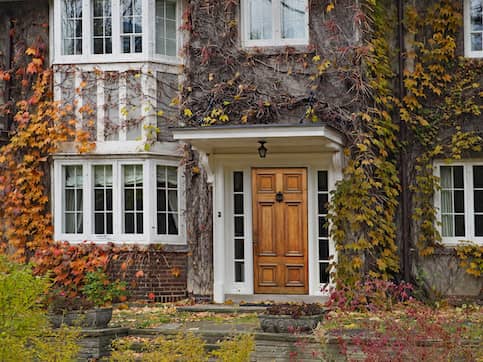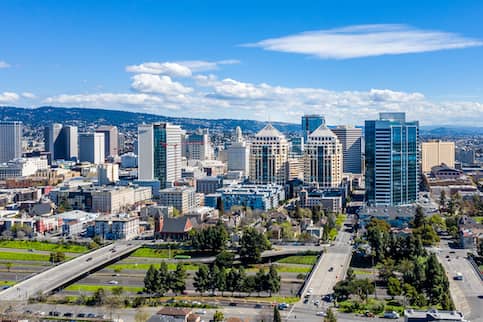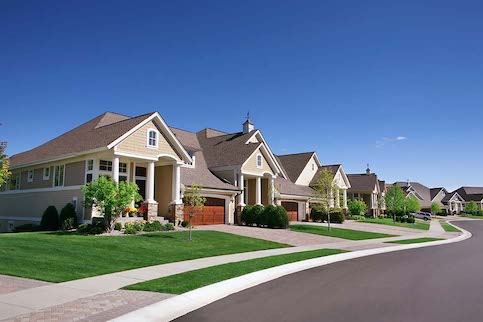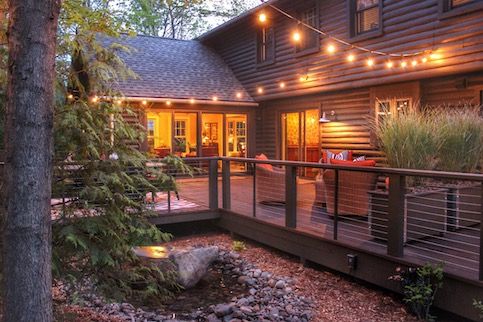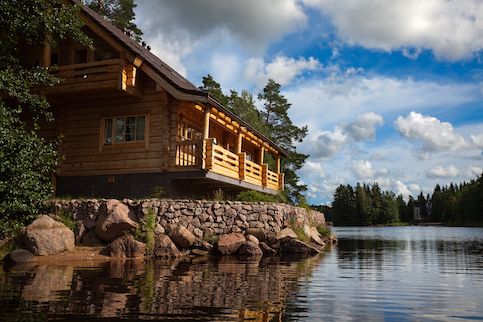Building Vs. Buying a Home: Costs, Pros and Cons

Choosing between building vs. buying a home is a big decision that can affect your finances and where you live for many years. Building a house helps you get the home of your dreams, but it often costs much more, whereas buying a house may mean sacrificing what you want but keeping more money in your pocket.
Find A Mortgage Today and Lock In Your Rate!
Get matched with a lender that will work for your financial situation.
Is It Cheaper To Buy Or Build A House?
According to the National Association of REALTORS® (NAR), the average sale price of an existing, single family home was $394,100 in 2023. In comparison, the average cost to build was $310,799 in 2023, according to HomeAdvisor. However, that number can range from $120,635 to $501,993.
Of course, which option is less expensive varies by location, the home itself and even the timeframe. When there is insufficient inventory of existing houses, the prices may increase to keep up with demand, and vice versa.
In addition, land is only available in limited quantity. If you live in an area where land is scarce, but demand is high, it could increase the price of newly built homes.
See What You Qualify For
Home Purchase
Home Refinance
Tap Into Equity
Building A House Vs. Buying a House: At A Glance
When comparing building a house vs. buying, it’s important to look at the factors side-by-side.
Building A House | Buying A House |
|---|---|
Average cost to build: $310,799 | Average cost to buy: $394,100 |
Typical move-in time: 6 – 12 months | Typical move-in time: 1 – 3 months |
Built to suit your needs and tastes | Comes as is and may require renovations or repairs |
May include energy-efficient features | Energy-efficient features may need to be added, if desired |
Land availability plays an important role in costs and capabilities | Supply and demand of houses determine availability and prices |
Costs Of Building A House Vs. Buying
When comparing costs, it’s important to know that there will be very different types of expenses that come with building vs. buying a home.
Cost Of Building A House
Building a home allows more customization, but certain modifications could make it cost more. There are also additional expenses you may need to pay for, including land and labor. These cost estimates are based on HomeAdvisor findings for 2023.
Buying land: $3,000 – $150,000. The cost will vary by area, size and whether the land is finished or unfinished.
Plans and permits: $1,700 – $22,000
Construction materials: $200,000. This is the average cost, but it will depend on the quality and amount of materials needed.
Labor: $160,000. This is the average cost, but it will depend on the size of the home, your timeline and how much of your build is DIY.
Construction loan: 20% – 30% down payment. Traditional mortgage lenders won’t lend money on a structure that doesn’t exist, so you’ll need a construction loan. After the house is built, you can get a permanent mortgage.
Costs Of Buying A House
Buying an existing house means buying a home with a laid-out floor plan, completed features and even some decor. For some homebuyers, this is ideal because it’s less stressful with fewer decisions to make. Purchasing a home comes with different costs, including the home itself and any fees associated with financing your purchase.
Purchase price: Average of $394,100 in 2023. This will depend on market conditions and the location and size of the home. The amount you pay or borrow will be determined by the purchase price.
Down payment: 3% – 20% of the purchase price. Each loan program requires a different down payment.
Closing costs: 3% – 6% of the purchase price: In addition to the down payment, you’ll pay closing costs to finalize the home sale. Home buyers pay costs for underwriting, title searches, closing, document preparation and transfer taxes.
Same Costs For Buying Or Building
Whether you buy or build your home, you’ll need to pay to protect it and enjoy the amenities and services of your area.
Property taxes: You’ll also be responsible for the property taxes, which come due annually or biannually. The property taxes in each area vary and are based on the property size and assessed value. According to the tax foundation, the average property taxes paid in the U.S. in 2021 was $1,682.
Homeowners insurance: Homeowners with a mortgage are required to carry homeowner’s insurance, but it’s wise for any homeowner to consider it. Homeowner’s insurance protects you financially should your house experience a major disaster and require major renovations or rebuilding. The average annual cost of homeowners insurance across the U.S. is $2,777, according to insurance.com.
Cost Of Building Vs. Buying A House: Financing
Both ways to get a house are going to cost a large sum of money. Whether building or buying, you may need to get financing either way.
| Building A House (Construction Loan) | Buying A House (Mortgage) |
|---|---|---|
Interest rates | 6% – 8% | 6% – 7% |
Closing costs | 2% – 5% of loan amount* | 3% – 6% of sales price |
Down payment | 20% – 30% | 3% – 20% |
If you’re getting a construction-to-permanent loan, you’ll likely only pay closing costs once. However, if you get a construction loan and a mortgage separately, you may pay closing costs for both loans.
Pros And Cons Of Building A House Vs. Buying A House
Next to the cost of building a house vs. buying, there are other pros and cons to consider.
Pros Of Buying A Home
Buying a home can be less stressful because there may be fewer decisions and less money to come up with upfront.
- Move-in ready: Buying a house that’s ready to move into immediately can mean less to juggle. You don’t have to find somewhere else to live while the home is built and all design and layout decisions are already made for you by the previous homeowners or builders. If there are necessary or desired repairs, you can do them at your leisure but get settled in the home right after closing on it.
- Faster timeline: Depending on the seller’s timeline, you can typically close on an existing home within 30 – 60 days.
- Easier to finance: Existing homes are less risky for mortgage lenders, so they often have better rates and terms for financing. You may not have to jump through as many hoops or make as large of a down payment as you might on a custom home.
- Room for negotiation: There’s usually room to negotiate with the sellers when buying an existing home. This includes negotiating the price, move-in date and what’s included in the sale. In a buyer’s market, sellers may be more willing to negotiate than in a seller’s market.
Cons Of Buying A Home
There are downsides to buying an existing house, too. Understanding what could go wrong can help you determine if it’s the right choice.
- Less customization: Buying an existing home means buying what someone else built, which may or may not suit your tastes or needs. If you want to make changes, it will increase the cost of owning the home, and not all changes will be possible based on the existing floor plan.
- Might need renovations: Even if you love a home’s layout and features, most existing homes need renovations or repairs. You may find out before closing and negotiate the costs into the sales price, but there’s always the risk of unpleasant surprises.
- Lead paint or other hazards: Home inspectors may find things wrong with the home that could be hazardous, such as lead paint, mold or asbestos. Depending on the issue and its complexity, it could add to the home’s cost, plus be risky for you and your family.
- Competition: In a seller’s market, many buyers could look at and compete for the same house. This could increase the price or make it more difficult to get your offer accepted, stretching out the time it takes to buy a house.
Pros Of Building A Home
Building a home has many advantages for home buyers. Here’s what you might enjoy.
- Build your dream home: Building a house means you create the floor plan from scratch, typically with an architect. You can add the features you’ve always wanted in a house, assuming it fits within your budget.
- Add energy-efficient upgrades: Newer homes have more energy-efficient features, which can save you money and help save the planet. An energy-efficient home may also have a higher resale value if you decide to sell it.
- No competition: You don’t have to worry about other buyers outbidding you for a home – and there’s usually less competition for a plot of land for sale. Once you own the land, you are the only person who can build a home on the lot.
- Less maintenance and covered repairs: Since everything is new in the home, you’re not likely to experience major repair needs. And if you do, they may be covered under warranty. Many builders have warranties on their work, so if you have any problems once you move in, you’re covered.
Cons of Building A Home
Building a home has its downsides, including its cost and the time commitment. Here’s what to consider.
- High cost of building materials: Building material costs are based on availability – also known as supply and demand. During the pandemic, there was an incredible shortage of supplies, and costs increased drastically. While material costs aren’t as high today, they are still costly and greatly increase the cost of building a house.
- Cost of labor: The labor costs to build a home can account for just under 50% of the cost to build a home. If you live in an area with a labor shortage or high demand for custom homes, the labor costs can greatly increase the cost of building a home.
- Time-consuming: You’re at the mercy of the builder – and mother nature – when building a new house. If there are unforeseen delays or the builder works slower than anticipated, you could wait 6 – 12 months before being able to move into your home, while still paying for it and another place to live.
- Complicated financing options: Since you likely don’t have several hundred thousand dollars to pay to build a house, you’ll need financing. Not many lenders offer construction financing, though, because of the lack of collateral and the risk they pose.
The Bottom Line
Choosing between building vs. buying a home is a big decision. Weigh the pros and cons and compare them to your homeownership goals and financial situation. Both options may require some sacrifices either financially or in the features you get in your home. When you’ve decided which is right for you, start the mortgage process to see what terms you can get to achieve your dreams of homeownership.
